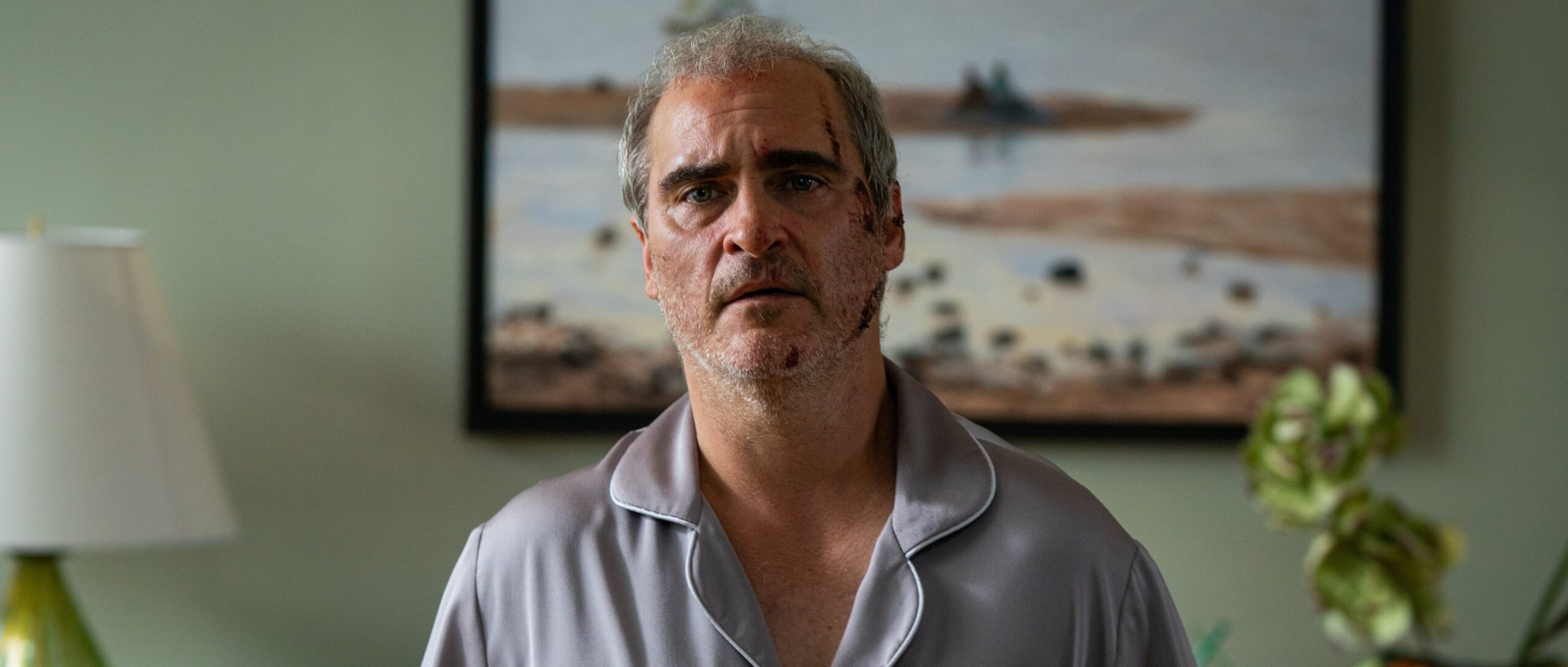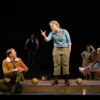There is no doubting that the titular Beau (Joaquin Phoenix) is most certainly afraid in Ari Aster’s dark absurdist comedy Beau is Afraid. Beau has every reason to be afraid in Aster’s mashup of The Book of Job meets Freudian Oedipal theory meets American social anxiety. Nowhere is safe, not Beau’s slum apartment in the city, not the houses in the suburbs, and not even idyllic forests. Aster has crafted a near three-hour panic attack that is so full of symbolism that whether any of the events happened is irrelevant – something, no matter how left-field it may seem, reaches into the recesses of personal and societal fears on a level that is for want of a better word, primal.
Beau is a quiet man middle-aged man who lives in a neighbourhood that is beyond skid road. The socially dispossessed gather in an area that no sane person would enter. But Beau is probably beyond sanity, although the reason for him living in the vicious enclave will be revealed later down the line. Beau regularly sees a therapist (Stephen McKinley Henderson) who he tries to explain his fear of everyday items such as mouthwash. The therapist is less interested in Beau’s fear of consumer products than he is in getting Beau to talk about his mother. Beau has an upcoming visit to his mother, Mona’s (Patti LuPone) house (he’s going “home”) to mark the anniversary of his father’s death. How does Beau feel about his mother? Well, it’s complicated. The therapist prescribes him a new anti-anxiety medication Zypnotycril which must be taken with water and sends him out into the hellscape.
Everything in the world is acting against Beau who is permanent reaction mode. From the moment he left the womb (and we get to see it) something has been building that reduces the man into a state of extreme guilt and helplessness. Aster isn’t shy on relying heavily on the mother = womb/tomb motif (the film goes from one to the other) and in a particularly garish scene a younger Mona (Zoe Lister-Jones) explains to a younger Beau (Armen Nahapetian) that his father died the very moment he was conceived of a hereditary condition that has probably been passed on to Beau himself.
The main plotline is that Beau needs to visit Mona but through circumstances beyond any human’s control he is delayed. He tries to explain to Mona that he will be delayed but her silences and implications that Beau just doesn’t want to come home are filled with the kind of menace only a parent well versed in delivering guilt trips could conceive. The situation becomes even more dire when he tries to book another flight only to find out his credit card has been cancelled and speaks to a UPS delivery man who informs him that the woman whose number he has called has been decapitated by a chandelier. Mona Wassermann is dead and now it is up to her son to become a man and bury her.
Stalking the streets of Beau’s nightmare slum is a naked serial killer called the Birthday Boy Stab Man and Beau ends up on the street naked, almost shot to death by a cop, and is run over by a suburban couple played by Nathan Lane and Amy Ryan and ends up ostensibly kidnapped by them. Roger and Grace welcome Beau into their home, although the welcome is not extended by their teen daughter Toni (Kylie Rogers). Roger is a surgeon and is apparently helping Beau recover from the accident and the stabbing by The Birthday Boy Stab Man, but why has he placed an ankle monitor on Beau? They promise to get Beau to Wassertown for Mona’s funeral, but they keep putting it off.
Again, circumstances spiral out of control. Roger and Grace are mourning the death of their son who was killed in action and have taken in another PTSD affected veteran, Jeeves (Denis Menochet) and the whole family takes medication like candy. The suburbs are far from ‘perfectly safe’ and when Toni takes her own life by drinking baby blue paint Beau is blamed and must flee.
Beau’s bizarre odyssey takes him to a forest where he meets a travelling theatre troupe called the Orphans of the Forest. Lovingly accepted by the heavily pregnant Penelope (Hayley Squires) he watches a play about a man trying to reunite with his family. Here Aster imagines a different Beau, a Beau that eschewed society for a self-sustained lifestyle with a loving wife and family. Even when tragedy strikes in the imagined world, he becomes a hero searching for his wife and sons. Visually this world is rendered by the brilliant Chilean animators Joaquín Cociña and Cristóbal León (The Wolf House) and the odyssey with the odyssey is one of the most emotionally effective parts of the film with its undeniable beauty and melancholy reference to all the things Beau has never known.
Aster eventually has Beau reach his destination (although not his final destination) and it is here that we realise how much control Mona has had on his life. Mona was not a struggling single mother but the owner of a multi-million-dollar company that was involved in everything from pharmaceutical and health products to slum housing. Beau has never been free of his mother for a moment. The only time he seemed to be making his own decision is when he was a teen on a cruise and met Elaine Bray (played as a teen by Julia Antonelli and in the present day by Parker Posey). Mona’s machinations meant that she co-opted Elaine and made her part of the company keeping her far from Beau’s reach.
Eventually Beau is given a small moment of catharsis when he falls into the arms of adult Elaine (in a hilarious but also chilling sex scene that features Mariah Carey’s “Always Be My Baby”). Of course, Beau is always under his mother’s gaze and a resurrected (really never actually dead) Mona has been watching Beau in this most intimate moment.
Aster’s levels of absurdity are sustained throughout the film, but they coalesce in a nightmare attic scene where Beau encounters his nightmares in surreal flesh. Honestly there is just so much Freud in the film that if you are familiar with his work you will guffaw “Of course!”
Beau is Afraid is not a particularly accessible film, but it is memorable. Aster is throwing a lot at the audience and asking them to consider not only their own neuroses but the state of America in capitalist collapse. The sense of unreality is part of the DNA of the film – a man almost always dressed in baby blue who haplessly finds that all his anxieties are not only real but literally out to get him is horror film fodder, but Aster doesn’t want you to know what is real and what isn’t. Perhaps none of it is. Perhaps we are all living with neuroses we have built through nightmares and consumerism. Whatever Aster is doing is going to divide people on a level that Aronofsky’s mother! did. Is the film genius or hokum? Arguably it’s both. Beau is Afraid is a film that is deliberately comedic and horrible, and as such, sums up in its own over-the-top manner what it is like to live in a disconnected and disaffected society, mother issues or not.
Director: Ari Aster
Cast: Joaquin Phoenix, Patti LuPone, Amy Ryan
Writer: Ari Aster



